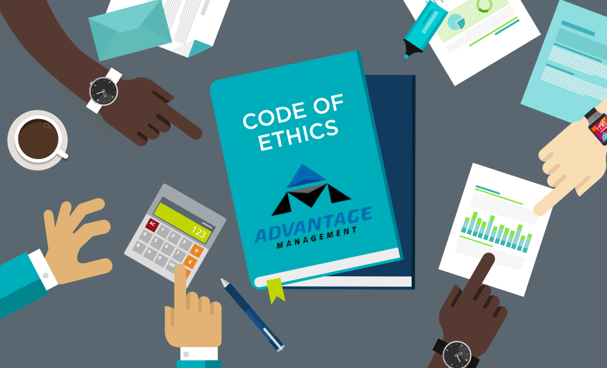One of our goals at Advantage Management is to educate our customers and keep our owners up to date on the best practices for your Association. In this newsletter, we want to share with you an article that was published in “Community Manager,” a trade journal printed by the Community Association Institute.
13 Standards for Ethical Board Leadership
Effective community association governance has many moving parts. Board members lead the community but frequently turn to community managers to oversee the association’s daily operations and, more importantly, carry out the policies set by the board. In their close working relationship, managers often provide the board with information that will assist them in their decision-making and avoid overstepping their authority.
Just as ethics are important to the community management profession, it’s crucial that board members adhere to a set of ethical standards that can help them fulfill their volunteer duties with the community’s best interests in mind. While not meant to address every potential ethical dilemma, CAI’s Model Code of Ethics for Community Association Board Members serves as a basic framework that can be modified by any community association.
Community managers can remind board members that they should:
- Serve the best interests of the association as a whole regardless of their personal interests.
- Use sound judgment to make the best possible business decisions for the association, taking into consideration all information, circumstances, and resources.
- Act within the boundaries of their authority as defined by law and the association governing documents.
- Provide opportunities for residents to comment on decisions facing the association.
- Perform their duties without bias for or against any individual or group of owners or nonowner residents.
- Disclose personal or professional relationships with any company or individual who has or is seeking to have a business relationship with the association.
- Conduct open, fair, and well-publicized elections that allow residents to exercise their right to vote.
- Always speak with one voice, supporting all duly adopted board decisions even if the board member was in the minority regarding actions that may not have obtained unanimous consent.
- Keep confidential any owner, resident, or other third-party discussions, decisions, and comments made at any meeting of the board properly closed or held in executive session unless specifically authorized by the board.
- Refrain from making unauthorized promises to a contractor or bidder.
- Decline gifts directly or indirectly from owners, residents, contractors, or suppliers.
- Represent only known facts in any issue involving association business.
- Refrain from personal attacks, harassment, or threats with colleagues, staff, or residents.


Recent Comments